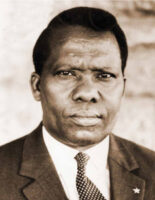Jaxon Levi Madoka Shako is one of the few Kenyan leaders who quit diplomacy to plunge into politics, eventually making it to the Cabinet as Minister for Tourism in 1969.
He was born in 1918 in Wundanyi, Taita-Teveta District and was educated at local primary and secondary schools, joining Alliance High School, Kikuyu, in the 1930s. He went for university education in the United Kingdom at the premier Oxford University.
When he returned to Kenya, he enrolled for a public administration course and thereafter served as a school headmaster before joining the colonial administration at a time when most senior administrators were white. He rose through the ranks to become Regional Government Agent in Mombasa, serving until independence in 1963.
Shako was an administrator when colonial governor Evelyn Baring declared a State of Emergency on October 20, 1952 in an effort to contain the Mau Mau in central Kenya and Nairobi. That day, thousands of Africans, including leaders of KAU, were arrested and later tried and jailed.
But other leaders applied pressure on the colonial government to grant more freedom to the African majority, forcing the colonial authorities to allow Africans to set up political parties, albeit on a regional, not a national, basis. By 1955, the Coast had two regional parties — Francis Khamisi’s Mombasa African Democratic Union (Madu) and Ronald Ngala’s Kilifi African Peoples Union (Kapu). Madu and Kapu would, in due course, give way to the more inclusive Coast African Association (CAA).
The CAA was essentially a Mijikenda and Mombasa affair, with very little appeal elsewhere in the province. The Coast was dominated by Madu, which was transformed into Kadu, led by Ngala, just weeks after Kanu was formed in May, 1960.
Kenyatta appointed Shako ambassador to France and West Germany in 1964, one of five envoys Kenyatta sent abroad. The others were Burudi Nabwera (Washington and the United Nations headquarters in New York), Dr Josephat Karanja (London), Henry Muli (Cairo) and Okuto Bala (Moscow).
Shako served as ambassador until 1967, when he was recalled. He retired from the Civil Service and entered politics at a time when his relative by marriage, Dawson Mwanyumba, was the MP for Wundanyi and Minister for Power and Communications. In the two years following his return, Shako consolidated his position in Wundanyi. In the 1969 elections, he ousted his younger relative from Parliament.
In the Cabinet Kenyatta formed after the election, Shako was appointed Minister for Tourism and Wildlife. Mwanyumba’s old Ministry of Power and Communications went to another Coast politician, Ngala, the region’s political kingpin who had been leader of the opposition party Kadu.
Shako forged a close political and business relationship with Kenyatta, the first family and powerful ministers from Kiambu. The relationship centred mainly on cash crop production, especially sisal, and the mining of rubies. This raised controversy. Many of Shako’s constituents and the larger Taita-Taveta showed open resentment towards their MP, accusing him of exploiting their natural resources without giving anything back to the community. No wonder in the 1974 elections, Shako lost and Mwanyumba came back to Parliament.
